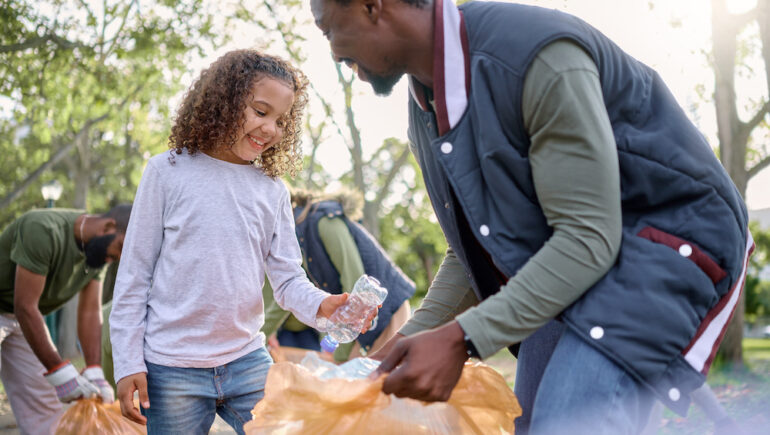Despite today’s convenience-based culture, raising eco-friendly children is easier than you might think. Here are ten tips to help your kids become the next generation’s eco heroes.
Start when they’re young.
It’s never too soon to introduce the idea of treading more lightly on the planet. Begin by making eco-friendly choices for your baby. Breastfeeding, cloth diapers, reusable washcloths, and second-hand clothing and toys are all great choices for parents interested in a more environmentally friendly lifestyle. Choosing to forgo all the so-called must-have baby gadgets — think Keurig-style formula dispensers — are another way to start modeling eco-friendly behavior. And finally, be willing to pass on the baby gear as your child outgrows it.
Tap into your child’s natural curiosity.
As your children grow, teach them about the environment and ways we can all help protect it. Encourage their love of animals and nature by taking them on walks, reading books about wildlife and the outdoors, and simply spending time outdoors with them.
Relate eco-friendly behavior to their surroundings.
Favorite animals and special places they love to visit, such as beaches, lakes or mountains, are a great way to start. Explain to your kids that humans need to help keep animals and their habitats safe, and then give examples of how we can do that. Picking up litter on a nature hike is an excellent relatable way to help children understand the connection between human behavior and preserving nature.
Make it fun, not punitive.
Focus on what you’re adding to a child’s life instead of what you’re taking away. This is especially important for kids who are already accustomed to single-serving snacks encased in cellophane, juice boxes and other disposable items. Use what you’ve already purchased and enlist your child’s help in choosing new items, such as reusable silicone pouches for snacks and a reusable water bottle for drinks. Most kids love to cook and bake, so tap into that natural interest and ask them to help make snacks instead of purchasing store-bought convenience items.
Introduce new habits slowly and one at a time.
Most kids adapt easily and are less resistant to change than adults. Nonetheless, change can be unsettling so introduce new habits and products slowly. Explain why you’re changing things and allow your kids to get comfortable before adding something else new and different.
Model eco-friendly behaviors.
Don’t expect your kids to adopt an eco-friendly lifestyle if they still see you drinking out of disposable water bottles or opting for plastic grocery bags. Children learn best by seeing trusted adults act responsibly.
Seek out other families with similar values.
This is especially important as your kids get older and may be sensitive to being “different” from other children. Look for environmental groups or clubs in your area that cater to families and children. Participate in litter sweeps or recycling programs where you’re likely to meet other families with similar interests.
Take advantage of teachable moments.
Take advantage of teachable moments on ordinary outings and vacations. At the grocery store, for instance, point out similar products that come in glass and plastic containers. Explain why glass is a better option for the planet. When planning a beach trip, explain how the ocean and its creatures are important to the health of the planet. Then take it a step further and plan with them how you can enjoy the beach without harming it. Using reef-safe sunscreens and removing all trash after a beach outing are great starting points.
Incorporate a more eco-friendly lifestyle into your special events and holidays.
Instead of buying all plastic disposables for a child’s birthday party, use your everyday dishes and utensils. Make it festive by accenting with decorative paper napkins that can be composted. Use toys or figurines your child already owns for decorations. When gift-giving is involved, encourage loved ones to give outings or experiences over toys and other physical gifts. An outing to an ice cream parlor, a farm, a movie, or a zoo or theme park are all things children love to do.
Let your kids take the lead.
When your children come home from school with an idea or fun fact about helping to save the planet, get excited about it. Ask them to tell you more and do your best to incorporate the idea into your family routine. Discuss it at the dinner table and let your children know they are important contributors to the household and the greater community.
Related – Energy-Saving Tips: Your Wallet and the Planet are Winners


